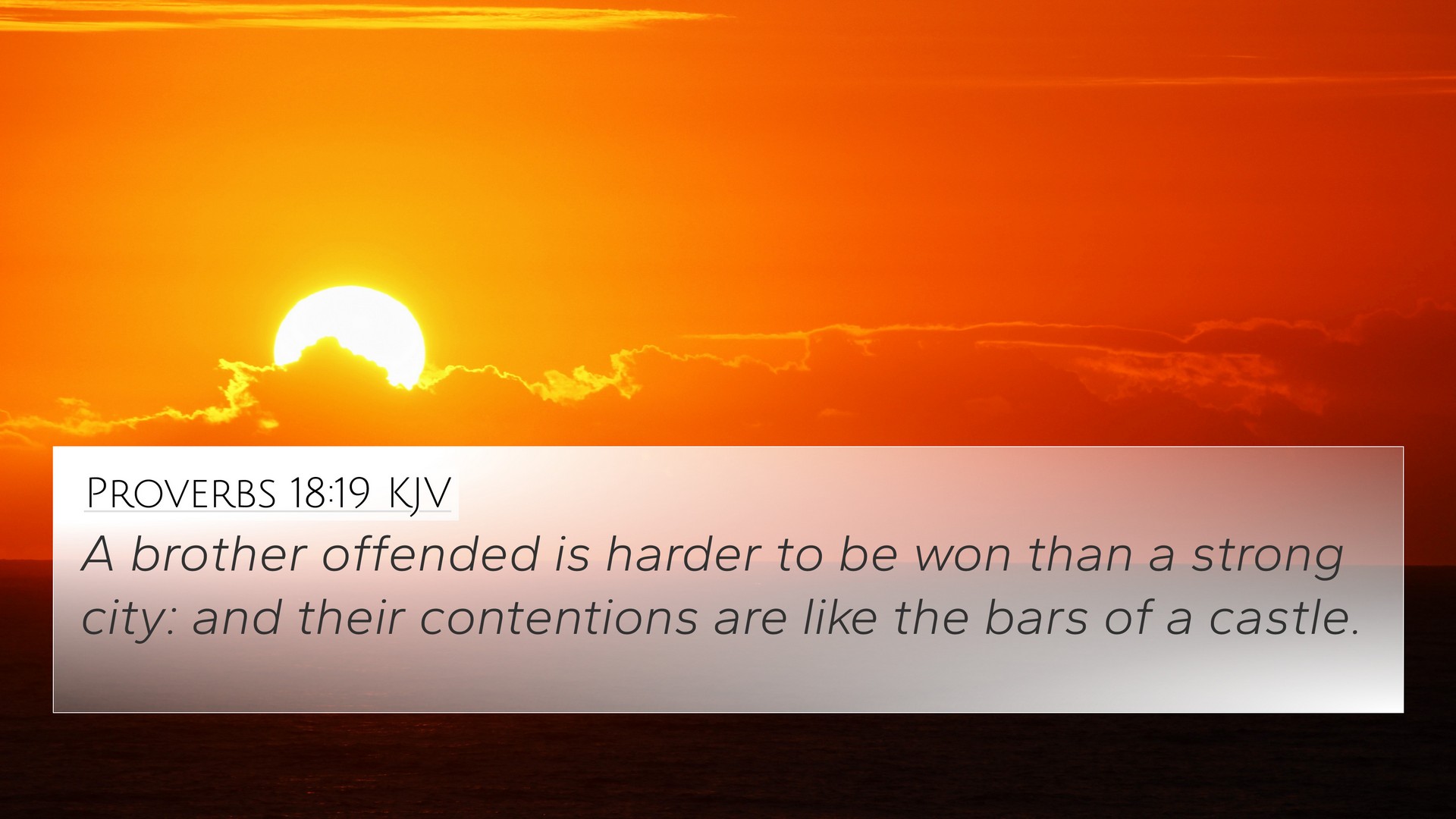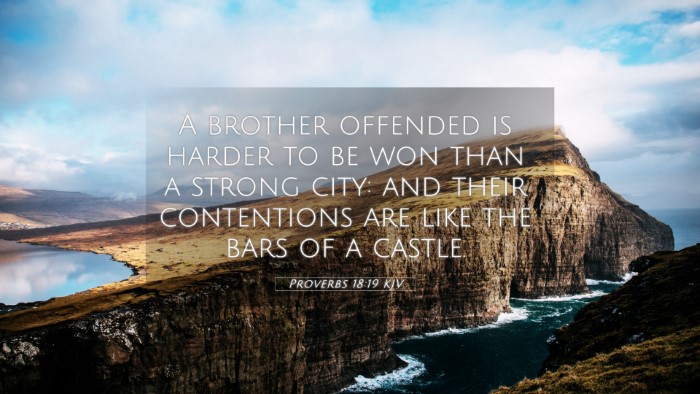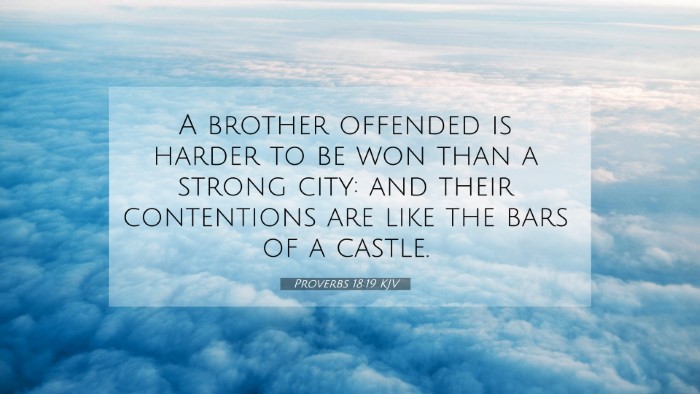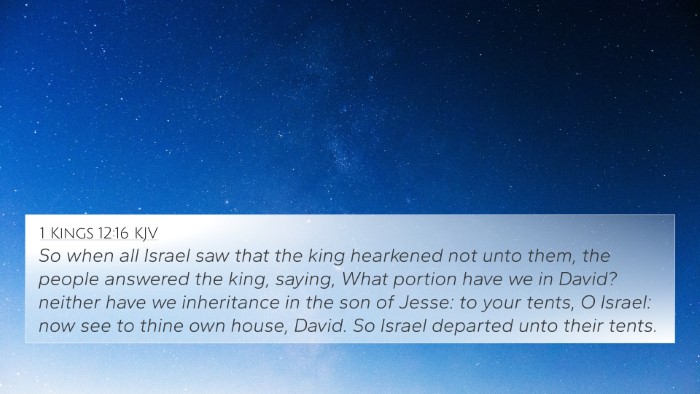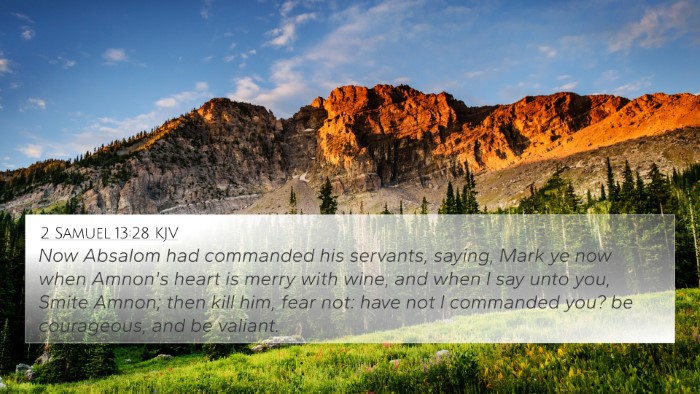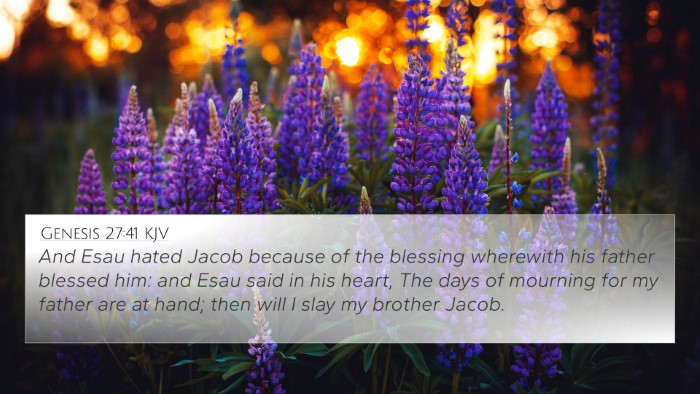Understanding Proverbs 18:19
Proverbs 18:19 states: "A brother offended is harder to be won than a strong city: and their contentions are like the bars of a castle." This verse encapsulates the complexities of human relationships and offers profound insights into the nature of conflict and reconciliation.
Summary of Verse Meaning
In this verse, Solomon draws a vivid comparison between a wounded relationship and a fortified city. The implication is that once a sibling or friend feels offended, or their feelings are hurt, it creates barriers that are extremely difficult to overcome. The contention arising from such offenses is likened to the impenetrable walls that protect a city, making reconciliation a formidable challenge.
Key Insights from Commentaries
-
Matthew Henry's Commentary:
Henry emphasizes the severity of relational rifts, noting that once trust is broken, it takes significant effort to rebuild. He compares the effort needed to mend a relationship to overcoming the fortified defenses of a city.
-
Albert Barnes' Notes:
Barnes suggests that offenses can lead to deep-seated grievances that hinder the potential for reconciliation. He points out that the emotional and psychological barriers erected during conflicts are often stronger than physical fortifications.
-
Adam Clarke's Commentary:
Clarke highlights the relational dynamics at play and the potential for bitterness to grow from an offense. He notes that healing requires humility and often the willingness to forgive, which can be rare in contentious situations.
Bible Verse Cross-References
Understanding Proverbs 18:19 can be enriched by exploring several related scriptures that highlight themes of conflict, reconciliation, and the importance of maintaining relationships:
- Matthew 5:23-24 - Emphasis on the importance of reconciling with a brother before bringing gifts to the altar.
- James 1:20 - A reminder that the wrath of man does not produce the righteousness of God, encouraging patience in conflicts.
- Galatians 6:1 - Guidance on restoring an offended brother gently, showing the necessity of humility in reconciliation.
- Proverbs 15:1 - The effectiveness of gentle words in diffusing anger and conflict.
- Romans 12:18 - Instruction to live peaceably with all, indicating the effort required to maintain harmony.
- Luke 6:31 - A call to treat others as one wishes to be treated, foundational for all relationships.
- Colossians 3:13 - Encouragement to forgive as the Lord forgave, reinforcing the importance of mercy in the healing process.
- Proverbs 12:18 - Acknowledgment that reckless words can pierce like swords, emphasizing the hurt caused by careless speech.
- Ephesians 4:32 - A directive to be kind and compassionate, forgiving one another to foster unity and healing.
- Matthew 18:21-22 - Peter's question about forgiveness and Jesus' profound response about boundless forgiveness.
Connecting Insights: Inter-Biblical Dialogue
When we explore cross-references, we identify connections between different verses that enhance our understanding of Proverbs 18:19. The relationships between these verses highlight a recurring theme in scripture: the importance of maintaining peace and reconciliation within relationships.
For instance, the connection between Proverbs 18:19 and Matthew 5:23-24 is particularly strong. Both emphasize the high value placed on reconciliation, suggesting that unresolved conflict can hinder one’s relationship with God.
Thematic Connections
The thematic connections among these scriptures revolve around:
- Forgiveness: Essential for relational restoration.
- Humility: Required to approach reconciliatory efforts.
- Communication: The necessity of gentle and thoughtful communication in resolving disputes.
- Peace: The overarching goal of addressing offenses is to restore peace and unity.
Tools for Bible Cross-Referencing
Engaging with cross-references can be extremely beneficial in deepening understanding of biblical texts. Utilizing tools such as a Bible concordance or a cross-reference guide can enhance the study experience by illuminating connections between verses and themes. These resources help in:
- Identifying cross-references related to specific themes and verses.
- Conducting comparative studies of different sections of the Bible.
- Preparing for sermons or discussions on particular biblical principles.
- Creating a thematic study of relational dynamics within the scriptures.
Conclusion
Proverbs 18:19 serves as a poignant reminder of the complexities of human relationships and the significance of addressing offenses. By engaging with this verse and its cross-references, one can gain a deeper understanding of the biblical perspective on reconciliation, forgiveness, and living in harmony with others. This thorough approach not only enhances one’s personal spiritual journey but also equips individuals with the tools necessary for healthy relationships within their communities.
